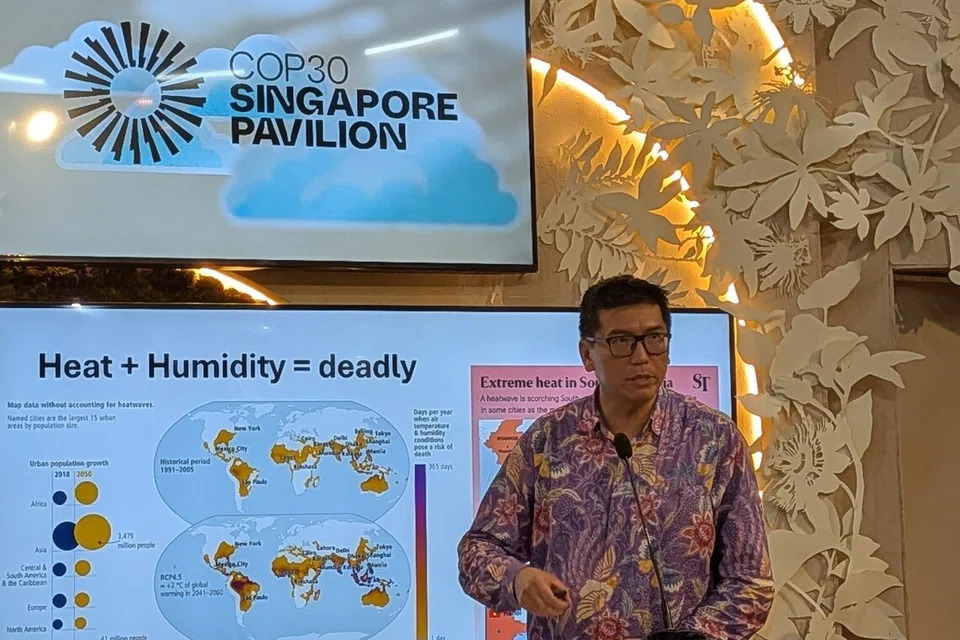Sharing renewable energy sources in S-E Asia key to dealing with rising heat: Climate scientist

(Photo credit: ST PHOTO/ANG QING)
Source: The Straits Times
Sharing renewable energy will be key to South-east Asia’s ability to deal with deadly heat without driving up planet-warming carbon emissions, climate scientist Winston Chow told The Straits Times on Nov 11.
Those in the region who work outdoors or live in informal settlements like slums are most at risk of suffering from rising temperatures, the co-chair of the working group of the UN’s Intergovernmental Panel on Climate Change for climate impacts, adaptation and vulnerability told the media on the second day of COP30.
His comments came after 185 cities, including Singapore, committed to localising efforts to make cooling more accessible and less polluting.
Cooling can be unsustainable when it uses electricity generated from fossil fuels, which contribute to emissions. Some refrigerants relied on by cooling devices are also powerful greenhouse gases.
The United Nations Environment Programme (UNEP) report on Nov 11 warned that demand for cooling is projected to triple by 2050 because of rising temperatures, growing populations, and increased access to inefficient cooling systems.
Left unchecked, emissions from cooling could nearly double, overwhelming power grids and putting climate goals out of reach, the report found.
“The challenge for most of South-east Asia is that we are still starved in terms of the access to renewable energies,” said Prof Chow, noting that the region lacks rich solar, wind and hydropower resources.
“Some parts of South-east Asia have that (renewable energy sources) more than others. Therefore, that speaks to the importance of an Asean renewable grid, which hopefully will be in the works.”
Asean is aiming to build an interconnected power grid by 2045 that will take a more affordable and reliable supply of electricity to its member states.
Notwithstanding the challenge of decarbonising the grid’s electricity supply, Prof Chow, who is Singapore Management University’s professor of urban climate, said the tropical region has great access to climate solutions that harness the power of natural ecosystems, which the UNEP report highlighted as a key priority to ensure sustainable cooling.
These nature-based solutions include community gardens, street greenery and urban agriculture, which not only naturally cool the environment, but also have other co-benefits such as siphoning carbon emissions from the atmosphere.
Prof Chow lauded the report for finding ways to reduce risks for the vulnerable populations living in the most heat-stressed areas in the tropics, which encompass both South-east Asia and the Brazilian city of Belem, where the COP30 climate talks are being held. Heat stress happens when the body cannot cool itself down.
In South-east Asia, those who work outdoors or live in informal settlements like slums do not have access to cooling technology and green spaces, he said.
Should countries act on the recommendations of the report, its cooling measures could expand access by 2050 to about three billion people at risk who lack the means to deal with extreme heat.
Echoing the report, Prof Chow said cooling measures that adapt to rising heat must also deal with the cause of rising temperatures.
He added: “On the emissions side, as we know, climate change is from greenhouse gas emissions and also from deforestation.
“You can’t just use air-conditioning without realising that most of the air-conditioning is powered by fossil fuels.”
A recent study found that more people in densely populated South-east Asia are dying from heat worsened by deforestation than in the Congo or Amazon rainforests, despite losing a smaller total area of forest than in the Americas.
Annually in South-east Asia, about 15,680 rural residents die of heat-related complications worsened by deforestation, compared with 9,890 for the tropical regions of Africa and 2,520 for the Americas.
Minister for Sustainability and the Environment Grace Fu said on Nov 11 that Singapore plans to share its technical expertise and experience in sustainable cooling and urban heat resilience with those on board the cooling initiative helmed by the COP30 Brazilian presidency and the UNEP.
Surrounded by passers-by mopping sweat off themselves in the sticky heat of the COP30 venue, Prof Chow said the initiative will build on momentum for more to join the movement towards cooling sustainably, which relies on cooperation across communities, sectors and governments
He said: “For every incremental increase in temperatures and global surface temperatures, the risk will become more apparent, and hopefully, that danger and hazard to everyone on this planet will be the impetus for more concerted action across communities.”
